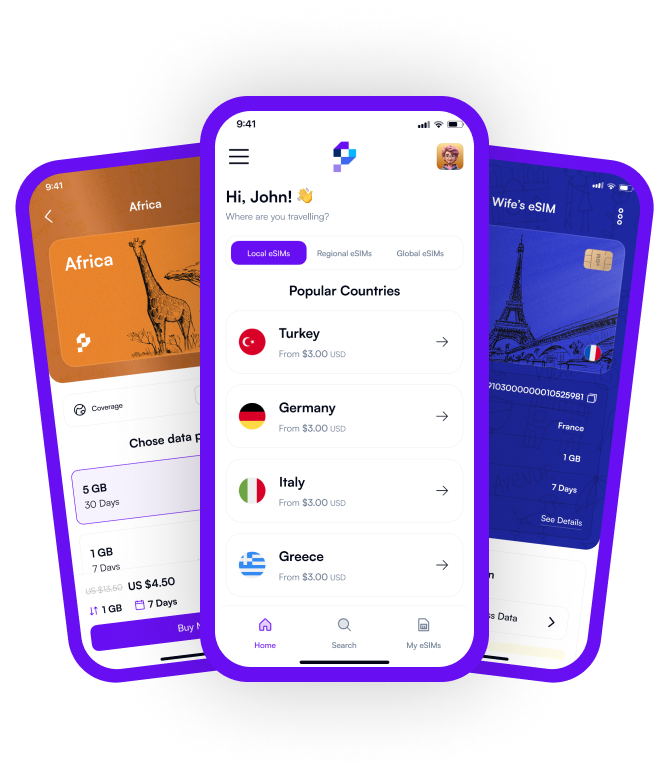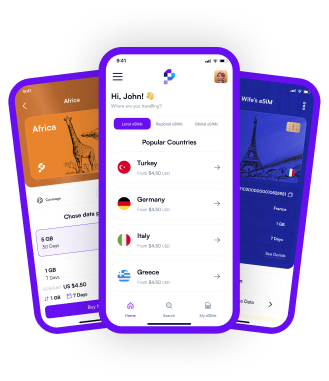Greece, with its rich history, breathtaking beaches, and world-famous cuisine, is a destination that attracts millions of tourists every year. While exploring this beautiful country, staying connected is crucial for both convenience and safety. But before you set off on your journey, you might be wondering: What’s the best way to stay connected in Greece? Should you opt for a traditional SIM card or the modern eSIM technology? In this blog post, we will compare both options to help you decide which one is best suited for your needs during your trip.
What is a SIM Card?
A SIM card is a small, physical chip that has been used for years to connect mobile devices to cellular networks. In Greece, many travelers prefer to buy local SIM cards during their stay. These SIM cards can be easily purchased from airports, local shops, or phone retailers, allowing you to access mobile data, calls, and SMS services via a local network once inserted into your phone.
Advantages of SIM Cards
- Easy Access: SIM cards are widely available throughout Greece, with special packages often tailored to tourists.
- Wide Compatibility: Since SIM cards work with all phone models, you won’t need to worry about compatibility issues.
Disadvantages of SIM Cards
- Physical Handling: Using a SIM card requires physically removing your existing SIM and inserting the new one. This can be inconvenient, especially if your phone doesn’t support dual SIM.
- Risk of Loss: Because a SIM card is a physical object, there’s a risk of losing or damaging it.
- Navigating Local Packages: Understanding and choosing the right data package in a foreign country can be challenging, especially when it involves a different language like Greek.
What is eSIM?
Unlike traditional SIM cards, eSIM is a digital technology that does not require a physical card. eSIM allows you to connect to mobile networks through a chip embedded in your device. It can be activated online, eliminating the need to swap physical SIM cards or search for local retailers. With eSIM, you can set up your connectivity before you even arrive in Greece, so you’re connected the moment you land.
Pocket eSIM provides fast, easy, and reliable connectivity in Greece and other popular travel destinations. You can learn more about how it works on the How It Works page.
Advantages of eSIM
- No Physical SIM Required: There’s no need to insert or remove a physical SIM card, as eSIM is digitally installed on your phone.
- Easy Activation: eSIM can be activated with just a few clicks, eliminating the hassle of searching for a SIM card or local shop.
- Reliable Coverage: Pocket eSIM offers broad coverage and fast internet speeds in Greece, ensuring a seamless online experience.
- Multi-Country Usage: You can set up your eSIM before traveling to Greece and stay connected as soon as you arrive, making it ideal for frequent travelers.
Disadvantages of eSIM
- Device Compatibility: Not all phones support eSIM technology, but many modern smartphones do. You can check if your device is compatible on the Compatibility page.
Comparing SIM Card and eSIM
1. Ease of Setup
Using a SIM card involves physically purchasing and inserting a card into your phone. This can be inconvenient, particularly if your phone only supports one SIM card. Additionally, setting up and activating the SIM card may require extra steps. On the other hand, eSIM offers a fully digital process. It can be activated by simply scanning a QR code or through an app, making it incredibly easy. By installing Pocket eSIM before your trip, you can instantly connect to the internet as soon as you land in Greece.
2. Cost and Data Packages
While local SIM cards in Greece may be affordable, understanding the available packages in another language can be confusing. Also, SIM cards usually offer limited data options. Pocket eSIM, on the other hand, provides flexible data packages. You can choose the right plan for your needs, allowing you to control your data usage throughout your trip.
3. Network Quality and Coverage
Greece has good network coverage in major cities and tourist areas. Both SIM cards and eSIMs offer reliable connectivity here. However, Pocket eSIM provides more flexibility with network coverage. It automatically connects to the best available network, ensuring you have access to the fastest and most reliable internet.
4. Security and Convenience
There is always a risk of losing or damaging a SIM card. Also, when changing phones, you need to physically transfer the SIM card. With eSIM, these concerns are eliminated since the entire process is digital. Your eSIM remains securely stored in your device, without taking up any physical space.
Which Option is Better?
Both SIM cards and eSIMs are viable options for staying connected during your trip to Greece. However, when it comes to convenience, flexibility, and security, eSIM is the superior choice. If you’re looking for a fast, hassle-free solution, Pocket eSIM is the best option for staying connected in Greece. It also offers the added benefit of dual-SIM functionality, allowing you to use both your personal and work lines simultaneously.
Additionally, Pocket eSIM can be installed before you even arrive in Greece, meaning you’ll have internet access as soon as you land, without wasting time searching for a local SIM card. To learn more about how Pocket eSIM can enhance your trip, visit the Home page.
Conclusion
In a destination as popular as Greece, staying connected is essential for a smooth and enjoyable travel experience. eSIM technology offers several advantages over traditional SIM cards, including faster setup, greater convenience, and enhanced security. With Pocket eSIM, you can set up your connection before arriving and enjoy seamless internet access throughout your trip.

